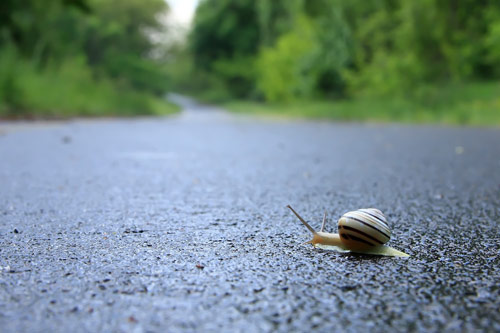

We tend to think of Rewire Me moments as sudden flashes of insight—but Carl Honoré’s most recent book, The Slow Fix: Solve Problems, Work Smarter, and Live Better in a World Addicted to Speed, explains why that isn’t always the case. He points out that “[i]n every walk of life, from medicine and relationships to business and politics, we are hooked on the quick fix.” He goes on to say, “The hard, unpalatable truth is that the quick fix never truly fixes anything at all. And sometimes it just makes things worse.”
“Without resorting to a single bullet point in 262 pages, he shatters leadership and talk-show clichés, with encouragement like “sweat the small stuff.””
Honoré’s writing is often eloquent, and his prose reflects his thesis as he takes time to explore and analyze each idea. Without resorting to a single bullet point in 262 pages, he shatters leadership and talk-show clichés, with encouragement like “sweat the small stuff.” Honoré’s examples and anecdotes—from the wisdom behind Van Halen’s famous “no brown M&M’s” clause to the “congenial” Norwegian prison system designed to curb recidivism—are worth contemplating. Unlike the authors of so many quick-fix, meme-studded self-help books, Honoré practices what he preaches, taking time to build his theories and exploring them through both narrow and wide lenses.
Although he accepts that there are times—in surgery or on the battlefield, for example—when we can’t stop to ponder, Honoré explains that his focus in The Slow Fix is on the kind of problem “where the parameters are unclear and shifting, where human behavior comes into play, where there may not even be a right answer.” He maps out the process: confess, think hard, think holistic, think long, think small, prepare, collaborate, crowdsource, catalyze, devolve, feel, play, evolve. Each element builds on the one that precedes it, not as a checklist or an if/then logarithm, but as a recipe with room for improvisation. By approaching the material this way, he achieves the goal he states in his Introduction: “to draw some universal lessons about how to find the best solution when anything goes wrong.”
A Slow Fix begins by acknowledging and examining our mistakes—something that tends to be discouraged in our culture, where the word “problem” is masked in euphemisms like “issue” and “challenge.” Honoré then spends four entire chapters on methods of thinking—pondering, mulling, incubating, sauntering, and considering the long view—arguing against snap judgment.
Once we’ve genuinely thought things through, options are presented and rejected, contingencies are considered before they can arise. Honoré quotes engineer Peter Hodgman: “No matter how good you are, you’re always better with someone else. No one can do it all on their own,” and shows how this has been put into practice on collegial and global scales, from Freud’s Wednesday night salons to the giant think tank of the Internet, demonstrating how “[w]e are more creative when solving other people’s problems.”
“Many of the most successful Slow Fixers temper their brains with their hearts by tapping into humility and empathy. This in turn opens up space for fun, and bringing games into the Slow Fix allows for inspiration and competition, helping us overcome inertia and bad habits.”
First we need to strike a balance between the group and the individual, because “even the smartest team and wisest crowd can only take you so far.” Then we need to rely on, or have an underlying and connective vision of, “a hub for the network, a lighting rod for the crowd”—a Steve Jobs or an Ernest Shackleton, to bring direction and passion to a problem. This person must be able to ultimately transfer his or her power and give a sense of ownership to the people for whom it has the most meaning—those with the problem being solved—taking the process out of the office or laboratory and into the field. This empowerment balances logistics and facts with emotional connection. Many of the most successful Slow Fixers temper their brains with their hearts by tapping into humility and empathy. This in turn opens up space for fun, and bringing games into the Slow Fix allows for inspiration and competition, helping us overcome inertia and bad habits. An element of humor lets us accept that there are “perpetual problems” that, by virtue of their size or complexity, can never be completely solved, although they can be outgrown or shifted. Adaptation and uncertainty are key because we should “never rush a Slow Fix.”
Honoré’s The Slow Fix is a roadmap for genuine transformation, for rewiring the way we overcome both individual and universal obstacles. “The good news is the world is full of Slow Fixes. You just have to take the time to find and learn from them.”
Watch Carl Honoré’s TED Talk on the Slow Movement.
Post Disclaimer
This content is for informational purposes only and does not constitute medical advice. Please consult a healthcare professional for any medical concerns.




2 Comments
Jeremy Goldman
Nice review, Alice! I’ve heard good things about Honoré’s writing – the reviews on Goodreads are pretty strong too – so I’ll have to check this out.
Alice
Thanks, Jeremy! I think you’ll enjoy the book.